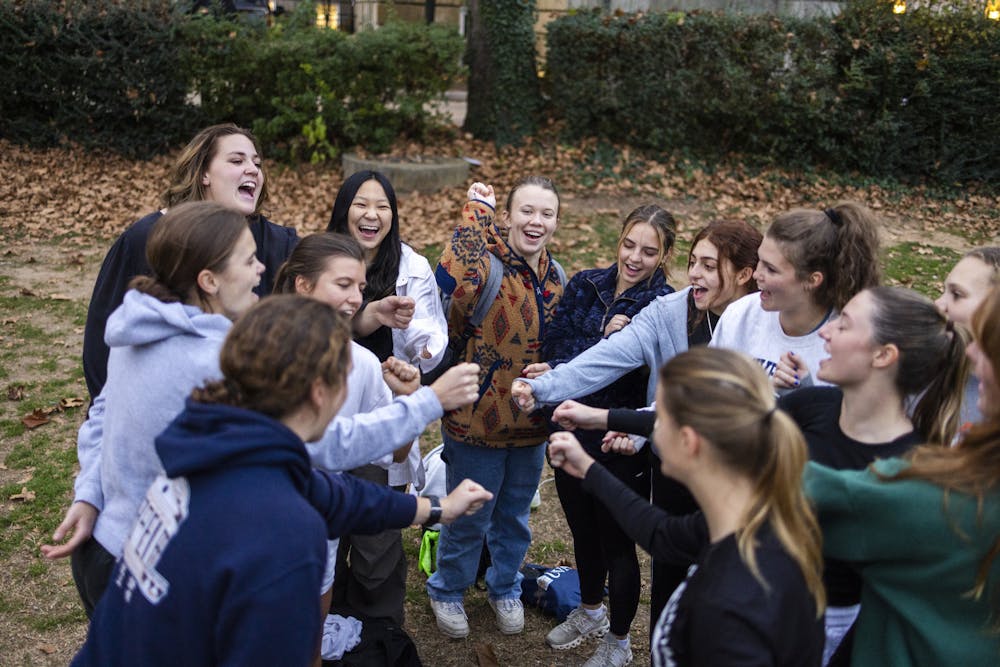When Virginia fans think of the powerhouses of the University’s athletics, the school’s varsity teams come to mind. But a new dynasty is building at the club level as well. Virginia women’s rugby has overcome injury over the past two years to stake their claim as one of the best club teams in the country. It has been a dominating season for the Flamingos (6-1), winning all but one of their seven opening fixtures before regionals this fall.
This wins are especially meaningful to the team given how last season went. Four senior players tore their ACLs, an unfathomable number considering the rarity of the injury. But as Coach Nancy Kechner said after an impressive 71-7 victory against North Carolina, this year’s squad is likely better because of it.
“The babies got some playing time, a lot of playing time,” Kechner said. “Now they’re second years and they’re starting and they have a year under them.”
Senior second row captain Katie Kasko emphasized how valuable the experience has been for both this season and future ones.
‘We learn from each other,” Kasko said. “The girl who was second row last year just graduated and now I’m the older one and I’m teaching the younger second row and then I’ll graduate and she’ll teach the next one.”
In a club sport, having a passing of the torch moment is extremely important, as the community formed in these organizations is what convinces players to devote time to the team — even if they do not have access to perks like scholarships that varsity athletes do.
For a lot of teams that do not cut players, senior players returning from injury and young players bursting through would create conflict and divide. Not for Virginia, as senior flanker captain Annika Antholis describes how the challenges the team faced in the past created even tighter bonds.
“We all love each other a lot,” Antholis said. “We got it together pretty quickly. Our team dynamics we worked really hard on.”
The Flamingos have become a family, nurturing the new generation, and Kechner has helped facilitate the transition. Returning for her 26th year as head coach, Kechner is the orchestrator behind the team’s success and togetherness, undoubtedly responsible for their consistent top-10 national ranking.
A Virginia alumna, Kechner started playing rugby right here in Charlottesville when two students encouraged her to try it out. “Oh my God, this is the best thing I’ve ever done!” was how she described her first taste of Virginia rugby in an interview in 2018.
After returning to Virginia, Kechner became the women’s rugby head coach, alongside getting her masters in instructional technology, working as software support in the library and part-time at Harvest Moon Catering. But what she enjoyed most by far was nurturing the team that made her first stint in Charlottesville so enjoyable.
“This is where I want to be,” Kechner said.
Kechner is also deeply invested in the community of the team, planning activities such as cooking team dinner every Friday before a match day. Her tactical nous was also on full display. Virginia’s scrums were indomitable, causing the referee to literally bend the rules to protect the Tar Heels from their ferocity.
“We have really good props,” said Kasko. “Our front row this year especially has been absolutely solid.”
A large part of the team’s success this year has come through the lessons learned when younger players were thrown into the fire. Kasko was quick to mention how senior prop India Glover learned how to pay it forward to the younger players.
“[Glover] learned under the older people on the team for a couple years,” Kasko said. “Now she's helping to teach Taylor [sophomore prop]... and [freshman prop Isabella] Gega.”
Clearly the tradition of passing the torch is working, as Kechner crowned freshman prop Isabella Gega “forward of the game” after the North Carolina victory.
Virginia as a school also bodes well for Kechner’s success. The focus for the coaching team is perfecting rugby IQ, allowing for a free flowing attacking brand of rugby.
“Smart people make better rugby players,” Kechner said. “To get into U.Va., you have to be a little killer your entire life. So that when you’re asked to play rugby and go out and do your thing, you’re like, ‘I’ve got this.’”
While the team may not be part of the traditional Division 1 structure like other Virginia sports teams, women’s rugby has formed a community that is just as tight-knit and competitive, and the creation of the community will undoubtedly lead to even more success at the club level down the line.
CORRECTION: A previous version of this article stated that Coach Kechner got her masters in construction technology. Kechner actually got her masters in instructional technology, and the article has since been updated to reflect this change.







